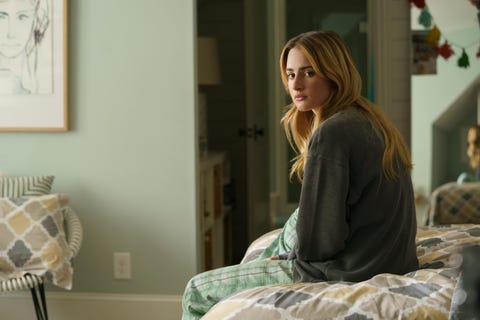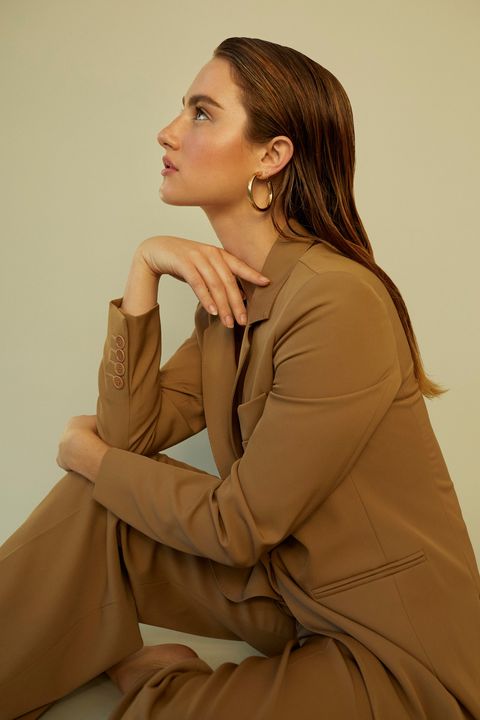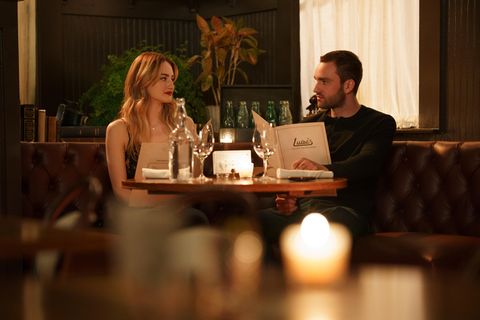Grace Van Patten knows a thing or two about selecting roles that suck viewers in. Following her stint as Zoe in the Nicole Kidman–fronted wellness cult drama Nine Perfect Strangers, the New York–born actress is now starring in Hulu’s Tell Me Lies.
A juicy college drama (of which fellow actress Emma Roberts is an executive producer), Tell Me Lies explores the all-encompassing chaos of toxic relationships and is based on the 2018 novel by author Carola Lovering. Van Patten stars as Lucy Albright, a jaded freshman sifting through a pileup of trauma including the death of her father, her mother’s affair toward the end of his life, and her first college roommate being killed in a hit-and-run the first week of school. In the midst of all this, Lucy falls for an older, mysterious man on campus, Stephen DeMarco, who becomes one of the most formative relationships of her life—for better or worse.
Tell Me Lies isn’t your average college romance story—or is it? It’s easy to gloss over the fact that young toxic romances are as frequent as they are, because they’re a tainted experience so many people work tirelessly to bury and forget. While some have critiqued the show as glamorizing the drama that comes with toxic romance (confusing but equally hot makeup sex being a big one), Van Patten clearly describes the series as a cautionary tale, or even an educational one, that can truly teach us what is and isn’t love.
More From Harper’s BAZAAR

“Lucy was searching for connection,” Van Patten tells BAZAAR.com of her character in the series. “[Stephen] tricks her into thinking that she’s connecting with him and that she’s being heard and she’s being seen. It was the perfect time in her life for him to come into her life—two people who are in need of the same thing like a puzzle piece at that very specific time in their lives. But that doesn’t mean that it’s meant to be.”
Ahead, Van Patten details her experience working on the series, getting into character alongside costar Jackson White, and what filming the show ultimately taught her about her younger self.
Your character, Lucy—I don’t want to call her an unlikeable character, but she’s very self-aware in the sense she knows she’s not the easiest person to deal with. She’s coping with family trauma, death, an all-encompassing relationship all at once. Why did you want to tackle this character?
Lucy was one of the most relatable characters I’ve read on the page. The whole misconception of Lucy is that you meet her and you really don’t know her trauma yet. You don’t know where she’s come from and what she’s dealt with. So she really does seem closed off and disconnected and numb. Once you slowly start learning about her past, you really start to understand her more.
I really love that uncovering of her and that journey that she goes on and that the audience goes on with her and how this boy that comes into her life completely chips away at this emotional wall that she spent years building up in order to protect herself. I found that to be such a relatable story for that age—when you latch onto new exciting feelings and you don’t know why, but it’s the newness and the passion that can be really easy to mistake for love or connection or whatever it may be.
Watching the first few episodes really brings back those raw emotions of being young and thinking certain scenarios and actions are acts of love but they’re really not. It’s something that’s really important to explore.
Everyone’s been through it, whether it be with a partner or with a friend. Communication is really hard. And if you haven’t taken the time to examine yourself and know what you need and what you want, I think that’s a hard part to overcome in any successful relationship.
For me at that age, I was trying to figure out who I was, but I really just thought I knew who I was. There’s that confidence of, “This is who I am, and this is what I want,” but you have nothing to pull from. The show can be hard to watch, because it’s kind of like watching yourself back at that age.
What did it take for you to prepare to get in character as Lucy? How did you try to embody the essence of what was originally present in the book for the screen?
I had a lot of really long talks with Meaghan [Oppenheimer]—the showrunner—who understood every character so deeply and had such smart things to say about them and their psychology and their journeys. She really helped me to understand Lucy even more.
Something that was really important for me in playing Lucy was to show that strong people, confident people can also be caught up in toxic relationships. It’s not always the weak girl or the victim—anybody is capable of being fooled. I’ve never seen that on a show where a main character who seemingly has it all together and then just completely loses it.
How did you and the rest of the team approach telling this story and making this show without glorifying toxic relationships?
That was really important for us. We really didn’t want to portray the message that this is what love is like and this is what it feels like. I think it was almost to be told as a cautionary tale and, in a way, comfort hopefully for people who have been in those situations and can connect to it and either be happy that they got away from it or inspired to get away from it.
To show this scenario at that age, that type of relationship can be deceiving and seem exciting because it’s new, and all those nervous, excited feelings could also be your body telling you to run away from it. It’s really hard to differentiate those feelings when you’re enamored with somebody. There’s a lot of shame and embarrassment when you’ve been in a toxic relationship like that, because it could make you feel like you are weak, when in reality, it’s the most common situation.
This is a show that’s obviously based on major chemistry between the two lead actors. What was it like working with Jackson James White?
Jackson is amazing. I remember reading the script for the first time and thinking that Stephen is one of the hardest characters to play and how is anybody gonna play this and not seem like a hundred percent a villain. I remember in our chemistry read, he came in and all the words were manipulative and his actions were manipulative, but he brought such a humanity to him and he made him charming, and it made it so confusing.
The goal for the show was that we want the audience to be as in tune with Lucy’s head as possible. We wanted the audience to be just as confused, just as curious, just as off-put as Lucy is so that they understand the obsession and the need for validation and the need for approval. I thought Jackson made that character so much more dynamic than just being a full-blown sociopath.
Was there anything you learned or realized about your younger self playing Lucy?
Playing Lucy definitely held up a mirror to my younger self and made me learn a lot about myself then, which led to me understanding myself more now. I related a lot to Lucy at that age, especially in creating a wall in order to protect myself. I used acting as my outlet to express all of the emotions that I was afraid to express in real life until I slowly realized that vulnerability is really powerful and beautiful. The more honest I became with myself, the happier I was and the more free I felt. I grew from that, and it gave me hope that Lucy will too.
What I love about this show is that I think every person can take something different from it, depending on their personal experience. I hope it makes people reflect on themselves and their past, and maybe make it a little bit easier to see the red flags or offer support for people that are in something like that.
I think people forget that. When you break up with someone and it feels like the most isolating thing in the world, and then you think, “Oh, my God, everyone on this planet has been through this! Why is it still the most isolating feeling in the world?” This has a similar thing. Being in a bad relationship—everyone has, or will, go through that. I hope that it just provides comfort in the discomfort.
This interview has been edited and condensed for clarity.
Bianca Betancourt is the Culture Editor at HarpersBAZAAR.com where she covers all things music, film, and TV. When she’s not writing she loves impulsively baking a batch of cookies, re-listening to the same early 2000s pop playlist and stalking Mariah Carey’s Twitter feed.
Grace Van Patten Wants You to Know You’re Not Alone
Newspaper Updates PH



0 comentários :
Post a Comment